Step by step guide to making lipstick

Ever wanted to make your own lipstick? It's easier than you think!
We're going to be using our lipstick kit which includes a ready-made base recipe from Marie Rayma's book Make It Up.
Here we've got tips on the process and some great shade suggestions!
See the below for a video tutorial or click HERE to view it on YouTube.

Lipstick Kit is available with:
5 x plastic tubes (reusable)
5 x kraft tubes (compostable)
or 5 x 5ml pots (reusable and recyclable - to be used with a lip brush)
And optional mini measuring spoons, which you will need with you don't already have some.
Let's play!
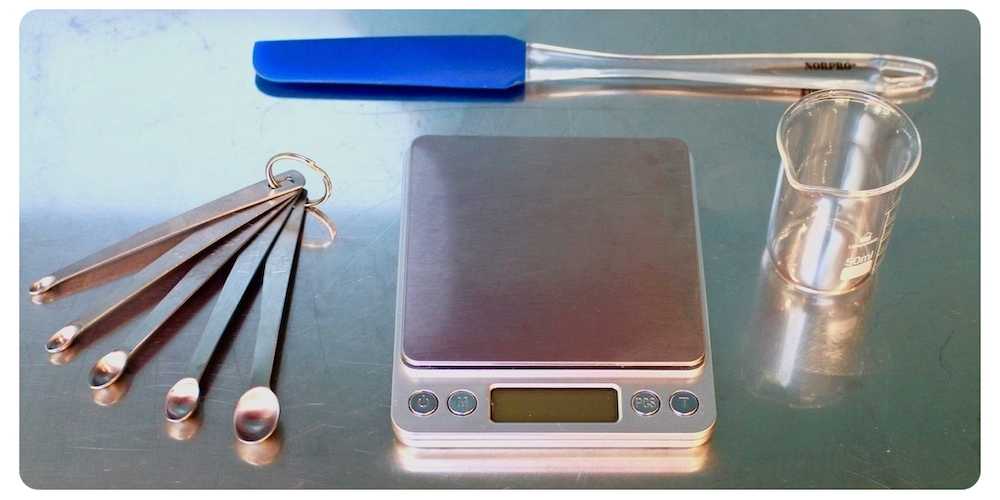
Equipment
First we have mini scales that measure in increments of .00g, great for weighing small amounts of ingredients.
Then we've got glass beakers for melting and mixing your product in and mini silicone spatulas which are great for smooshing and blending your pigment evenly through your base. Both are very useful but not imperative, you can use any heatproof dish and a regular spatula, they just make the job much easier.
Last but far from least are mini measuring spoons. I would go as far as to say you NEED these because they are the only way to measure the tiny amounts of colour you will be working with and the recipe is measured in TADS (1/4 tsp), PINCHES (1/16 tsp) and DROPS (1/64 tsp) which are marked on them. Without them it's a bit like trying to follow a dinner recipe and having to estimate how much a tablespoon is.

Adding pigment
Weigh out 6g of your base into your beaker or dish. It's good to use 6g even if you're filling a 5g container to make allowances for mixture getting lost around the sides of your dish, better to have a touch too much than too little. It won't look like much, I'm making 12g here so will look like half as much as the far left picture.
Now it's time to add your pigment. With your measuring spoons take out the colour you want and sweep the top with a knife to level it out, don't pack them tight, this way you'll know you're always using the same amount therefore upholding the integrity of your shades.
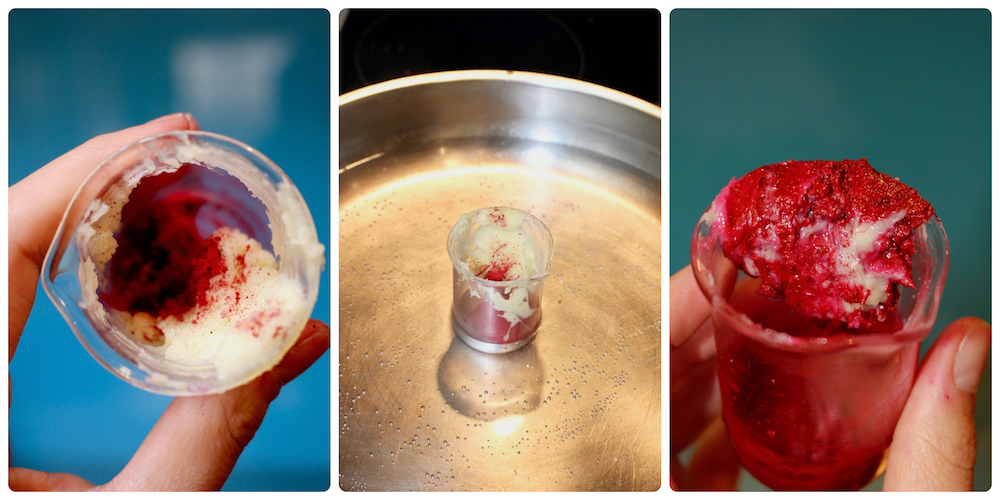
Blending in the pigment
Once you've got your pigment in with your base (remember you don't have to put it all in at once, you can build colour gradually until you reach your desired shade) place it back in the water bath. You want the water to be hot but not boiling as boiling water runs a higher risk of splashing into your mixture and if that happens you'll want to chuck it out and start again. Give it a minute or so to soften up and then start blend and, you guessed it, smooshing! You can take it out of the water to do this and put it back in to soften it again. As you can see from the far right picture it will be pretty globby at first. Really make sure you work all the pigment in as a little goes a long way so every bit of it works towards your final shade.
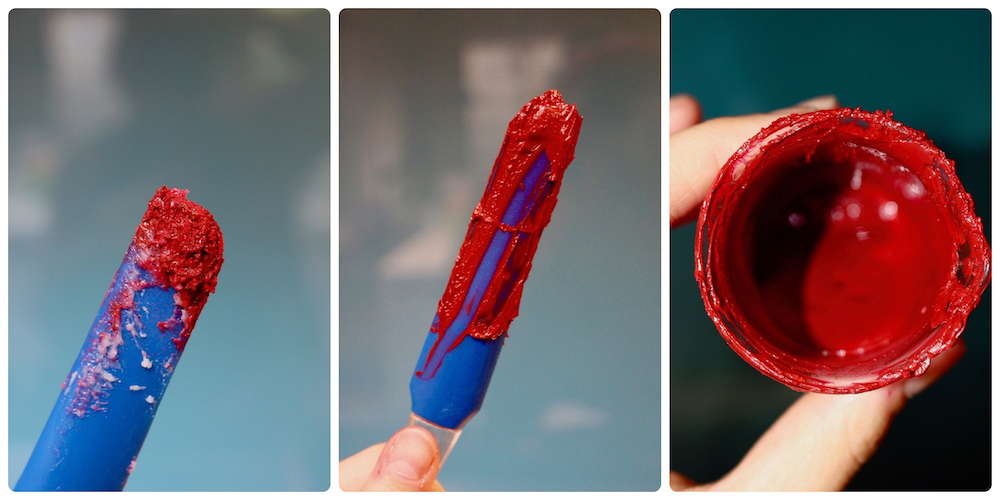
This is where the mini spatula is really useful, for running around the edges and gathering mixture that's stuck to the sides and popping it back in to soften. Just keep smooshing! You'll see the consistency change and when you're convinced it's all mixed in you're ready to pour.
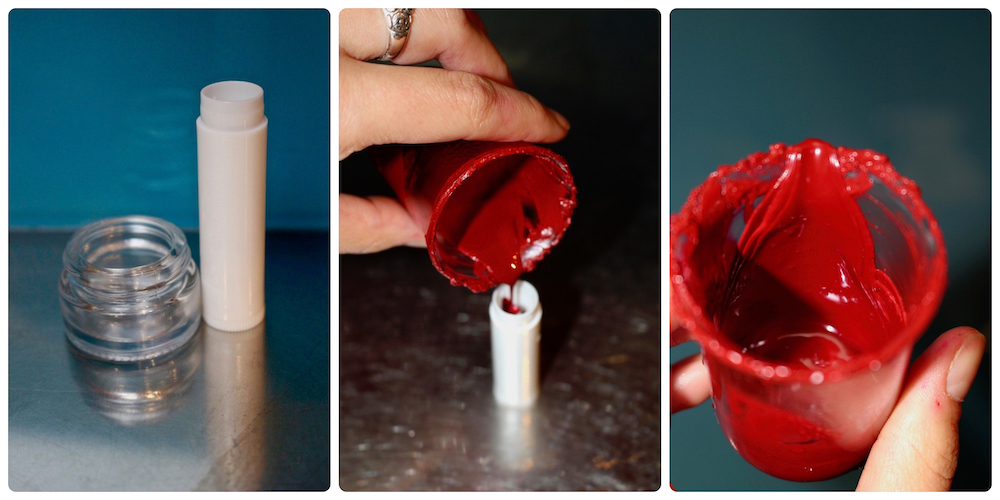
Pouring
Prepare the container/s that you want to fill, here I'm using a 5ml glass pot and a 5g plastic tube. You want a flat, easily cleanable surface. As you can see in the picture on the far right, as you pour it will solidify so just run your spatula around the edge and place it back in the water bath to soften it up again. You might have to do this three or four times.
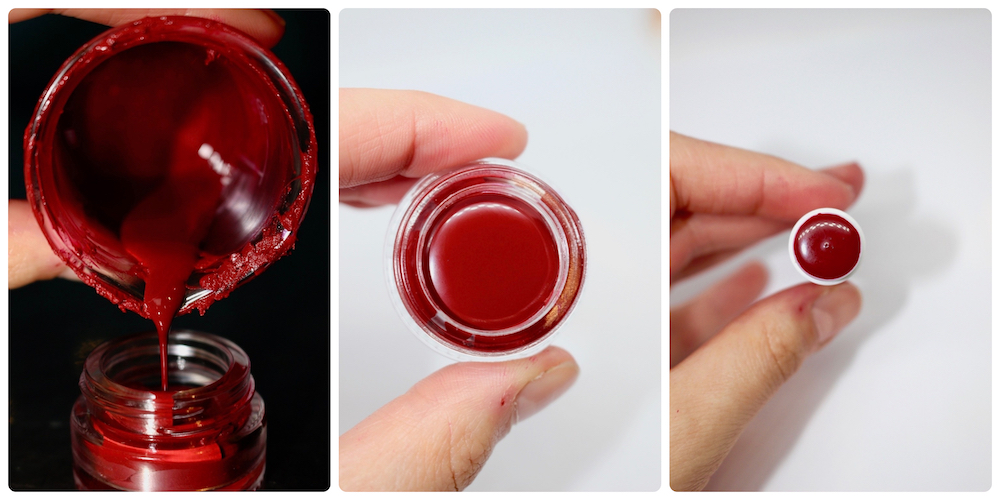
You made lipstick!!
Leave your lipstick to set. Putting it in the fridge will speed up the process.
Shade suggestions
When formulating your own shades the rule of thumb is 7/16 x (PINCHES) of pigment per 6g of base, not including micas (the pigments that do the grunt work when it comes to colouring). Feel free to experiment with less or more.
And have fun!

Sasha
Deep red
3/8 tsp (DASH) red rouge
1/16 tsp (PINCH) red iron oxide
1/64 tsp (DROP) brown iron oxide

Manila
Orangey coral
1/16 tsp (PINCH) titanium dioxide
1/16 tsp (PINCH) red iron oxide
1/16 tsp (PINCH) + 1/32 tsp (SMIDGEN) yellow iron oxide
1/32 tsp (SMIDGEN) rouge red
1/16 tsp (PINCH) princess peach mica (optional)

Farrah
Bright pink
1/16 tsp (PINCH) + 1/64 tsp (DROP) rouge red
1/2 tsp + 1/16 tsp (PINCH) titanium dioxide
1/16 tsp (PINCH) princess peach mica

Naomi
Deep plum
1/8 tsp (DASH) + 1/32 tsp (SMIDGEN) rouge red
1/16 tsp (PINCH) red iron oxide
1/16 tsp (PINCH) brown iron oxide
1/16 tsp (PINCH) titanium dioxide
1/32 tsp (SMIDGEN) + 1/64 tsp (DROP) *ultramarine blue

Bob
Dark brown with bronze shimmer
3/16 tsp (PINCH) brown iron oxide
1/8 tsp (DASH) yellow iron oxide
1/16 tsp (PINCH) + 1/32 tsp (SMIDGEN) red iron oxide
1/8 tsp (DASH) bronze satin mica
All colours available HERE
Equipment available HERE
Make It Up by Marie Rayma available HERE
*Ultramarines are not approved for use in lipsticks in the USA but they are approved for use in all cosmetics without restriction in Europe. Because of the approval given by the European Union we've included it but it is only required for the shade 'Naomi' so you can easily choose not to use it.

Comments